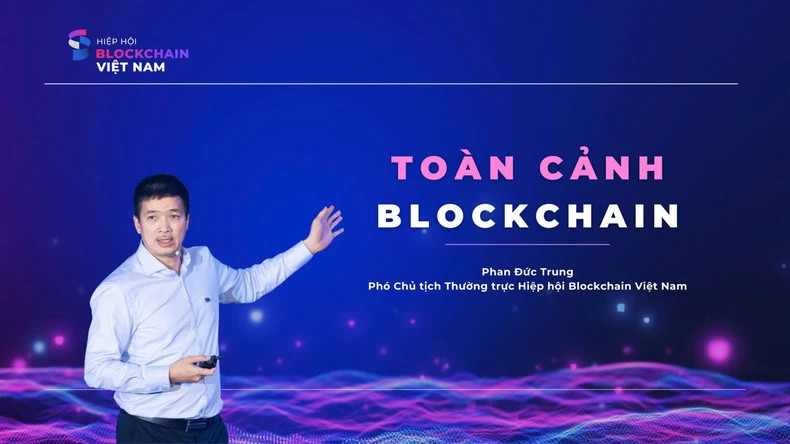On October 22, 2024, the Prime Minister issued Decision No. 1236/QD/TTg, announcing the National Strategy for Blockchain Application and Development up to 2025, with a vision to 2030. The strategy aims for Vietnam to join the leading nations in the region and secure an international position in the blockchain industry by 2030.
This represents a significant step forward, demonstrating the government’s strong commitment and clear orientation for the development of blockchain technology. It also sets the stage for a future legal framework, enabling businesses and individuals to operate safely and transparently. This will foster innovation, enhance Vietnam’s competitive capacity, and accelerate its integration into global technology trends.
In parallel, the National Assembly is considering the draft Digital Technology Industry Law, which is expected to be approved in May 2025. These documents will form the foundational legal infrastructure to bolster the burgeoning blockchain industry.
“Equal opportunities” for all economies
According to Chainalysis’ 2024 report, Vietnam has over 20 million cryptocurrency holders, representing 20% of its population, ranking fifth globally in cryptocurrency adoption. Another report from Chainalysis reveals that cryptocurrency inflows to Vietnam reached 120 billion USD last year, equivalent to more than a quarter of the nation’s GDP.
Interestingly, among the top 20 countries with the highest cryptocurrency adoption, most are developing nations, such as India, Nigeria, Indonesia, Vietnam, Ukraine, and the Philippines. This highlights that economic development levels, technical infrastructure, or legal regulations are not significant barriers to blockchain technology adoption.
Blockchain is seen as an “equal opportunity” for all economies, particularly for developing countries like Vietnam, which must seize this chance. Unlike technologies such as AI or semiconductors, which require massive investments and advanced infrastructures, blockchain offers a more accessible path for nations with limited resources.
For businesses, the National Blockchain Strategy creates substantial opportunities. It establishes a favourable and clear legal environment, allowing companies to confidently invest in blockchain solutions without concerns about regulatory compliance risks.
The government’s encouragement of blockchain applications in finance, logistics, agriculture, and data management generates significant domestic demand and expands the blockchain market for service providers.
Moreover, sandbox mechanisms introduce controlled testing environments where companies can safely experiment with blockchain technologies before scaling up, optimising resources and minimising risks.
“Make in Vietnam” platforms promote the development of locally made blockchain platforms, enhancing the competitiveness of domestic businesses both locally and internationally.
The National Blockchain Strategy also emphasises training high-quality personnel by integrating blockchain studies into universities and educational institutions and launching online open learning platforms (MOOCs). A well-trained workforce will help Vietnam lead blockchain innovation trends.
 |
| Teaching the “Overview of Blockchain” course on the MasterTeck online learning platform. (Screenshot from Masterteck.edu.vn) |
The Vietnam Blockchain Association (VBA) actively supports this strategy through workshops, conferences, and direct training programmes. VBA, alongside its affiliate ABAII (Institute of Blockchain and AI Technology), has introduced MasterTeck, the first MOOC platform under the National Blockchain Strategy.
Challenges and expectations for the future of Vietnam’s blockchain industry
Promoting the widespread adoption of blockchain technology in Vietnam will bring significant benefits, expanding the ecosystem of blockchain applications and fostering new business models across critical sectors such as finance, logistics, agriculture, and public data management. These achievements are a strong catalyst for Vietnam’s blockchain industry to grow robustly and sustainably, positioning it as a competitive advantage for the country on the international stage.
However, this breakthrough process is accompanied by substantial challenges and difficult problems that must be resolved simultaneously. These include perfecting the legal framework, addressing the shortage of high-quality human resources, shifting perceptions and traditional operating models, competing directly with foreign enterprises, investing in infrastructure, and tackling security issues.
While the National Blockchain Strategy has laid the foundation for building a regulatory framework, this process requires close coordination among various ministries and sectors, which may lead to delays in issuing regulations, causing difficulties for businesses and investors in the initial stages.
From a technological perspective, blockchain is a high-specialisation field, but Vietnam lacks a deep pool of skilled professionals. Public awareness, understanding, and acceptance remain inconsistent. Therefore, training and developing human resources, changing community perceptions, and evolving business processes and approaches are long-term challenges that require significant time and investment to drive the necessary changes. Only by building a team of high-quality professionals and establishing a modern technological foundation can Vietnam compete equally with international enterprises, even within its market.
Moreover, blockchain is a complex technology requiring strong security measures to mitigate risks such as cyberattacks or fraud. To ensure safety in large-scale blockchain deployment, enterprises must invest in security solutions, risk management, and system stability - challenges that are by no means small.
Despite these challenges, with strong governmental determination, a clear strategic roadmap, and commitments from all stakeholders, these barriers will gradually be overcome. Blockchain applications will become widely implemented in key sectors such as finance, logistics, healthcare, education, and public administration.
Notably, Vietnam is poised to establish a comprehensive and synchronised blockchain ecosystem based on high-quality “Make in Vietnam” blockchain platforms. This ecosystem will enable close collaboration between businesses, research organisations, and regulatory agencies, fostering innovative initiatives and creating a positive, cooperative environment. This will position Vietnam as a global destination in the blockchain industry, enhance national competitiveness, and drive robust economic growth in the digital technology era.
















